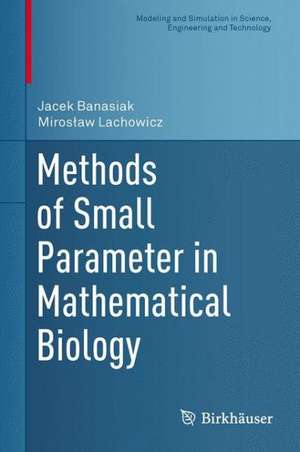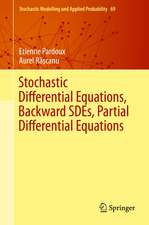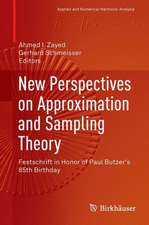Methods of Small Parameter in Mathematical Biology: Modeling and Simulation in Science, Engineering and Technology
Autor Jacek Banasiak, Mirosław Lachowiczen Limba Engleză Hardback – 6 mai 2014
| Toate formatele și edițiile | Preț | Express |
|---|---|---|
| Paperback (1) | 640.55 lei 6-8 săpt. | |
| Springer International Publishing – 23 aug 2016 | 640.55 lei 6-8 săpt. | |
| Hardback (1) | 651.19 lei 6-8 săpt. | |
| Springer International Publishing – 6 mai 2014 | 651.19 lei 6-8 săpt. |
Din seria Modeling and Simulation in Science, Engineering and Technology
-
 Preț: 410.88 lei
Preț: 410.88 lei - 18%
 Preț: 958.38 lei
Preț: 958.38 lei - 18%
 Preț: 784.13 lei
Preț: 784.13 lei - 15%
 Preț: 551.02 lei
Preț: 551.02 lei - 15%
 Preț: 642.68 lei
Preț: 642.68 lei -
 Preț: 392.60 lei
Preț: 392.60 lei -
 Preț: 388.34 lei
Preț: 388.34 lei - 18%
 Preț: 950.03 lei
Preț: 950.03 lei - 15%
 Preț: 643.84 lei
Preț: 643.84 lei - 15%
 Preț: 649.39 lei
Preț: 649.39 lei - 15%
 Preț: 644.18 lei
Preț: 644.18 lei - 20%
 Preț: 651.57 lei
Preț: 651.57 lei - 18%
 Preț: 1238.42 lei
Preț: 1238.42 lei - 15%
 Preț: 639.25 lei
Preț: 639.25 lei -
 Preț: 399.12 lei
Preț: 399.12 lei - 15%
 Preț: 650.19 lei
Preț: 650.19 lei -
 Preț: 387.58 lei
Preț: 387.58 lei -
 Preț: 392.97 lei
Preț: 392.97 lei -
 Preț: 396.24 lei
Preț: 396.24 lei - 15%
 Preț: 661.32 lei
Preț: 661.32 lei -
 Preț: 396.24 lei
Preț: 396.24 lei - 18%
 Preț: 943.88 lei
Preț: 943.88 lei - 18%
 Preț: 1386.17 lei
Preț: 1386.17 lei - 15%
 Preț: 648.42 lei
Preț: 648.42 lei - 15%
 Preț: 648.24 lei
Preț: 648.24 lei -
 Preț: 405.06 lei
Preț: 405.06 lei - 15%
 Preț: 641.38 lei
Preț: 641.38 lei - 15%
 Preț: 649.71 lei
Preț: 649.71 lei - 18%
 Preț: 1220.88 lei
Preț: 1220.88 lei - 15%
 Preț: 640.06 lei
Preț: 640.06 lei - 18%
 Preț: 952.26 lei
Preț: 952.26 lei - 15%
 Preț: 640.88 lei
Preț: 640.88 lei -
 Preț: 383.50 lei
Preț: 383.50 lei - 18%
 Preț: 1232.26 lei
Preț: 1232.26 lei - 15%
 Preț: 644.49 lei
Preț: 644.49 lei - 15%
 Preț: 655.60 lei
Preț: 655.60 lei -
 Preț: 400.26 lei
Preț: 400.26 lei - 23%
 Preț: 657.13 lei
Preț: 657.13 lei
Preț: 651.19 lei
Preț vechi: 766.10 lei
-15% Nou
Puncte Express: 977
Preț estimativ în valută:
124.60€ • 130.45$ • 103.10£
124.60€ • 130.45$ • 103.10£
Carte tipărită la comandă
Livrare economică 05-19 aprilie
Preluare comenzi: 021 569.72.76
Specificații
ISBN-13: 9783319051390
ISBN-10: 3319051393
Pagini: 300
Ilustrații: XI, 285 p. 17 illus., 9 illus. in color.
Dimensiuni: 155 x 235 x 20 mm
Greutate: 0.72 kg
Ediția:2014
Editura: Springer International Publishing
Colecția Birkhäuser
Seria Modeling and Simulation in Science, Engineering and Technology
Locul publicării:Cham, Switzerland
ISBN-10: 3319051393
Pagini: 300
Ilustrații: XI, 285 p. 17 illus., 9 illus. in color.
Dimensiuni: 155 x 235 x 20 mm
Greutate: 0.72 kg
Ediția:2014
Editura: Springer International Publishing
Colecția Birkhäuser
Seria Modeling and Simulation in Science, Engineering and Technology
Locul publicării:Cham, Switzerland
Public țintă
ResearchCuprins
1 Small parameter methods – basic ideas.- 2 Introduction to the Chapman–Enskog method – linear models with migrations.- 3 Tikhonov–Vasilyeva theory.- 4 The Tikhonov theorem in some models of mathematical biosciences.- 5 Asymptotic expansion method in a singularly perturbed McKendrick problem.- 6 Diffusion limit of the telegraph equation.- 7 Kinetic model of alignment.- 8 From microscopic to macroscopic descriptions.- 9 Conclusion.
Textul de pe ultima copertă
This monograph presents new tools for modeling multiscale biological processes. Natural processes are usually driven by mechanisms widely differing from each other in the time or space scale at which they operate and thus should be described by appropriate multiscale models. However, looking at all such scales simultaneously is often infeasible, costly, and provides information that is redundant for a particular application. Hence, there has been a growing interest in providing a more focused description of multiscale processes by aggregating variables in a way that is relevant and preserves the salient features of the dynamics. The aim of this book is to present a systematic way of deriving the so-called limit equations for such aggregated variables and ensuring that the coefficients of these equations encapsulate the relevant information from the discarded levels of description. Since any approximation is only valid if an estimate of the incurred error is available, the tools described allow for proving that the solutions to the original multiscale family of equations converge to the solution of the limit equation if the relevant parameter converges to its critical value.
The chapters are arranged according to the mathematical complexity of the analysis, from systems of ordinary linear differential equations, through nonlinear ordinary differential equations, to linear and nonlinear partial differential equations. Many chapters begin with a survey of mathematical techniques needed for the analysis. All problems discussed in this book belong to the class of singularly perturbed problems; that is, problems in which the structure of the limit equation is significantly different from that of the multiscale model. Such problems appear in all areas of science and can be attacked using many techniques.
Methods of Small Parameter in Mathematical Biology will appeal to senior undergraduate and graduate students in appled andbiomathematics, as well as researchers specializing in differential equations and asymptotic analysis.
The chapters are arranged according to the mathematical complexity of the analysis, from systems of ordinary linear differential equations, through nonlinear ordinary differential equations, to linear and nonlinear partial differential equations. Many chapters begin with a survey of mathematical techniques needed for the analysis. All problems discussed in this book belong to the class of singularly perturbed problems; that is, problems in which the structure of the limit equation is significantly different from that of the multiscale model. Such problems appear in all areas of science and can be attacked using many techniques.
Methods of Small Parameter in Mathematical Biology will appeal to senior undergraduate and graduate students in appled andbiomathematics, as well as researchers specializing in differential equations and asymptotic analysis.
Caracteristici
Unified approach to singular perturbed problems Applications and examples to mathematical biology Chapters are arranged according to the mathematical complexity Includes supplementary material: sn.pub/extras












